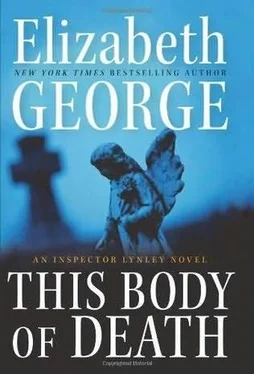“Respect again, but you can’t ask me-”
“True enough. Very true. But I’m not asking, am I. I’m advising. I’m suggesting. I’m instructing. All of which, I expect, you’ve heard before.”
“Not in so many words.”
“No? Well, you’re hearing them now. And can you honestly tell me that DI Lynley never took note of your overall appearance?”
Havers was silent. Isabelle could tell that the mention of Lynley had struck home. She wondered idly if Havers had been-or was-in love with the man. It seemed wildly improbable, ludicrous actually. On the other hand, if opposites did indeed attract, there could not have been two people more dissimilar than Barbara Havers and Thomas Lynley, whom Isabelle remembered as gracious, educated, plummy voiced, and exceedingly well dressed.
She said, “Sergeant? Am I the only-”
“Look. I’m not much of a one for shopping,” Havers told her.
“Ah. Then let me give you some pointers,” Isabelle said. “First of all, you need a skirt or trousers that fit, are ironed, and have the proper length. Then a jacket that is capable of being buttoned in the front. After that, an unwrinkled blouse, tights, and a pair of pumps, court shoes, or brogues that are polished. This isn’t exactly brain surgery, Barbara.”
Havers had been gazing at her ankle-hidden though it was by the top of her trainer-but now she looked up at the use of her Christian name. “Where?” she asked.
“Where what?”
“Where ’m I s’posed to do this shopping?” She made the final word sound as if Isabelle had been recommending she lick the pavement.
“Selfridge’s,” Isabelle said. “Debenham’s. And if it’s too daunting a prospect to do this alone, take someone with you. Surely you’ve a friend or two who know how to put together something suitable to wear to work. If no one’s available, then browse through a magazine for inspiration. Vogue. Elle.”
Havers didn’t look pleased, relieved, or anything close to accepting. Instead, she looked miserable. Well, it couldn’t be helped, Isabelle thought. The entire conversation could have been construed as sexist, but for heaven’s sake, she was trying to help the woman. With that in mind, she decided to go the rest of the way: “And while you’re at it, may I suggest you do something about your hair as well?”
Havers bristled but said calmly enough, “Never been able to do much with it.”
“Then perhaps someone else can. Do you have a regular hair-dresser, Sergeant?”
Havers put a hand to her chopped-up locks. They were a decent colour. Pine would come closest to describing it, Isabelle decided. But they appeared completely unstyled. Obviously, the sergeant had been cutting her hair herself. God only knew how, although Isabelle reckoned it involved the use of secateurs.
“Well, have you?” Isabelle asked her.
“Not as such,” Havers said.
“You need to find one.”
Havers moved her fingers in a way that suggested she wanted a smoke, rolling a fantasy fag between them. “When, then?” she asked.
“When then what?”
“When am I s’posed to take all of your…suggestions to heart?”
“Yesterday. Not to put too fine a point on it.”
“Straight away, you mean?”
Isabelle smiled. “I see you’re going to be good at reading my every nuance. Now”-and here they were at the real point, the reason that Isabelle had moved them from the desk to the conference table-“tell me. What do you hear from Inspector Lynley?”
“Nothing much.” Havers looked and sounded immediately cagey. “Talked to him a couple times is all.”
“Where is he?”
“Don’t know, do I,” Havers told her. “I expect he’s still in Cornwall. He was walking the coast last I heard. All of it.”
“Quite a hike. How did he seem to you when you spoke to him?”
Havers knotted her unplucked eyebrows, clearly wondering about the line of questioning upon which Isabelle had now embarked. She said, “Like you’d expect someone to seem when he’s had to pull the plug on his wife’s life support. I wouldn’t call him chipper. He was coping, guv. That’s about all.”
“Will he be returning to us?”
“Here? London? The Met?” Havers considered this. She considered Isabelle as well, obviously her mind clicking away with all the possibilities that might explain why the new acting detective superintendent wanted to know about the former acting detective superintendent. Havers said, “He didn’t want the job. He was just doing it temporarily. He’s not into promoting or anything. It’s not who he is.”
Isabelle didn’t like being read. Least of all did she like being read by another woman. Thomas Lynley was indeed one of her worries. She wasn’t averse to having him back on the team, but if that was going to happen, she wanted it to be with her prior knowledge and on her terms. The last thing she desired was his sudden appearance and everyone welcoming him with religious fervor.
She said to Havers, “I’m concerned about his well-being, Sergeant. If you hear from him, I’d like to know it. Just how he is. Not what he says. May I rely on you for that?”
“I suppose,” Havers said. “But I won’t be hearing from him, guv.”
Isabelle reckoned she was lying on both accounts.
MUSIC MADE THE ride bearable. The heat was intense because, while windows nearly the size of cinema screens lined both sides of the vehicle, they did not open. Each of them had a narrow, tilt-out pane of glass at the top, and all of these were open, but that did nothing to relieve what sunlight, weather, and restless human bodies effected within the rolling tube of steel.
At least it was a bendy bus and not one of the double-deckers. Whenever it stopped, both its front door and its back door opened and a gust of air-hot and nasty but still, new air-allowed him to breathe deeply and believe he could survive the ride. The voices in his head kept declaring otherwise, telling him that he needed to get out and get out soon because there was work to do and it was God’s mighty work. But he couldn’t get out, so he was using the music. When he had it coming through his earphones loud enough, it drowned out everything else, voices included.
He would have closed his eyes to lose himself in it: the sweep of the cello and its mournful tone. But he had to watch her and he had to be ready. When she made a move to debark, so would he.
They’d been riding for over an hour. Neither of them should have been there. He had his work, as did she, and when people didn’t do what they were meant to do, the world went amiss and he had to heal it. He was told to heal it, in fact. So he’d followed her, careful not to be seen.
She’d got onto one bus and then onto another and now he could see she was using an A-Z in order to follow the route. This told him that she was unfamiliar with the area through which they were riding, an area that looked to him like much of the rest of London. Terraces of houses, shops with grimy plastic signs above their front windows, graffiti looping letters into meaningless words like killdick boyz, chackers, and porp.
As they wound through town, on the pavements tourists morphed into students with backpacks who themselves became women in black from head to toe, slits for their eyes, in the company of men comfortably dressed in jeans and white T-shirts. And these became African children at play, running in circles beneath the trees in a park. And then for a time, blocks of flats blended into a school, and this in turn dissolved to a collection of institutional-looking buildings from which he turned his gaze. Finally, a narrowing of the street occurred and it then curved and they came into what looked like a village, although he knew it was not a village at all but rather a place that had been a village once. It was another of the multitude of communities consumed over time by the creeping mass of London.
Читать дальше












